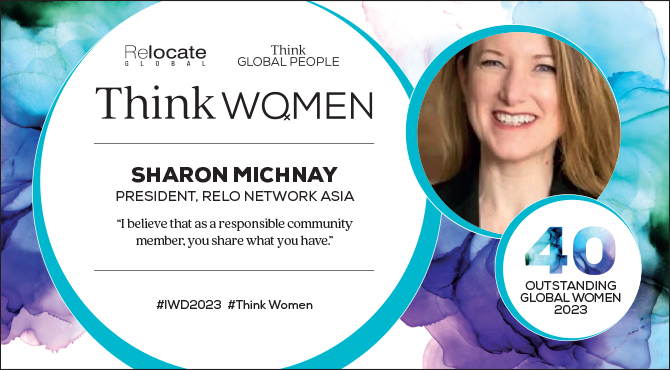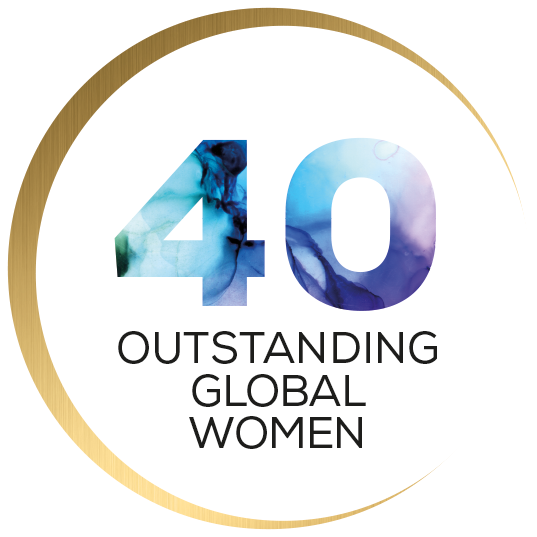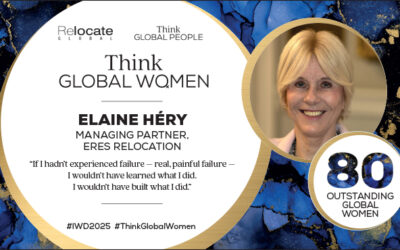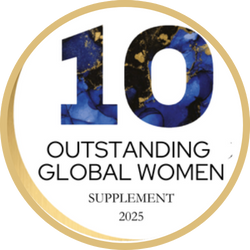Think Women
Sharon Michnay | 40 Outstanding Global Women 2023
Encouraging leaders to recruit inclusively
Asia is the world’s largest economic and trading region, with inter-region talent mobility on the increase. Sharon Michnay, president of Relo Network Asia, is dedicated to providing support and knowledge to the community, including helping launch the Asian Talent Mobility Alliance.
Despite being based in Chicago, Sharon Michnay spends her virtual working life in Asia. President of Relo Network Asia, she has been at the forefront of mobility in the region for the last seven years. Last summer, after two years of planning, she played an integral role in launching Asian Talent Mobility Alliance. This not-for-profit organisation is designed to connect industry professionals in the region and provide support, information and lobbying.
“I believe that as a responsible community member, you share what you have.”
SHARON MICHNAY, PRESIDENT, RELO NETWORK ASIA
“It’s a really exciting time to focus on Asia,” she says. “Covid may have thrown a wrench in things, but Asia is thriving. The number of companies headquartered there is growing and the region is entering a huge period of global prominence.”
The region’s collective economies have emerged as the new majority, says management consultant McKinsey. It accounts for over half of the global total of key metrics used to measure the world economy. Asia is now a key player in all five areas underlying its research: world order, technology platforms, demographic forces, resource and energy systems, and capitalisation.
SUPPORTING GLOBAL GROWTH
For Relo Network Asia, its largest markets are Singapore, Hong Kong, China, Malaysia, Korea and Japan. Launched in Hong Kong in 1981, it was one of the first companies to service employees transferred to Asia by Western companies. Now the team on the ground – from Malaysia to Myanmar – works with US-based sales and marketing teams to combine savvy local experience with maximum support for its international client base.
Sharon doesn’t whitewash the impact of the pandemic on the region, but says she has seen a significant bounce back. “There is incredible movement in the region and we are seeing a lot of Asian-based companies expanding and growing. Singapore and Tokyo have exploded and we are expecting to see those areas grow. China is a little further behind, having had some of the strictest responses to the pandemic, but Chinese companies are becoming more multinational and opening up internationally.”
Malaysia, Indonesia and Vietnam are all growth areas and Sharon believes Hong Kong is starting to pick up after its response to the pandemic. “Whether or not it will regain the status it once had remains to be seen, but it is still the gateway to mainland China and will always be a strategic location for companies.”
AGILE RESPONSES TO KEY REGIONAL CHALLENGES
Sharon started her career in real estate and worked up to executive director at Halstead Property, one of New York’s biggest agencies, where she ran the global services division. She moved to Chicago to join Relo Network Asia. “The company is the right size to have the agility to respond to the market,” she says.
The greatest challenges for families relocating around Asia – housing and education – have not changed since the pandemic. In popular locations such as Singapore and Tokyo, a housing shortage has combined with significant rent hikes, but she is hopeful prices have peaked. “Rents are still expensive, but prices are levelling off,” she says.
For the industry as whole, Sharon believes the digitisation of visas and immigration is one of the biggest issues. “Companies need to track their employees’ visa requirements carefully,“ she says. “It is a challenge for large organisations to make sure they are compliant, but getting caught outside the rules in a country like Singapore can be very damning.” The trend to remote working also presents its issues. “Establishing a presence in a country might require specialist visas or taxes to be paid there.”
Reducing costs is the other current industry challenge. “Everyone’s in cost-containment mode and there is a real pressure on talent mobility professionals to reduce costs.” One consequence is an increase in the one-day support requests Relo Network Asia has received.
“Nothing is impossible,” says Sharon, “but it would be useful to have better definition about what needs to be achieved in that day so we can set everyone’s expectations, including for our teams on the ground. Sometimes our destination consultants compensate for lower packages with their own time because they all really care about the assignees.”
COMMUNICATING AND COMMUNITY- BUILDING
With more inter-Asia relocations, Sharon is also seeing an increased need for multilingual support. “There’s nothing better than communication in your own language. We are moving more Chinese nationals into other locations and our team members need to speak Mandarin.” It’s a similar story with Japan. “A lot of Japanese companies will only deal with organisations offering a native speaker.”
In the end, the most important part of the job is communication, says Sharon, which is why she was passionate about the recent launch of the Asia Talent Mobility Alliance. She and Relo Network Asia’s CEO Steve Burson felt the talent mobility community in Asia needed a place to come together. “What works in Europe or North America is not always going to be the solution in Asia,” says Sharon.
The alliance is organised around four pillars: community; environmental, social and governance; advocacy and education. “There are some great organisations around, but we felt it was critical to be a not-for-profit with the focus on the member community. We are a no-solicit organisation created to share knowledge, provide support and drive growth while providing a virtual space to communicate.”
So far, the alliance is building a knowledge centre providing information on everything from ESG to policy samples and industry reports and insights. It is also introducing a mentoring system, which will have an emphasis on peer-to-peer connections.
“I believe that as a responsible community member, you share what you have,” says Sharon. “I wouldn’t be here if I hadn’t had the opportunity to connect with others from organisations such as the Corporate Relocation Council and the Worldwide Employee Relocation Council, whose members shared openly with me.”











